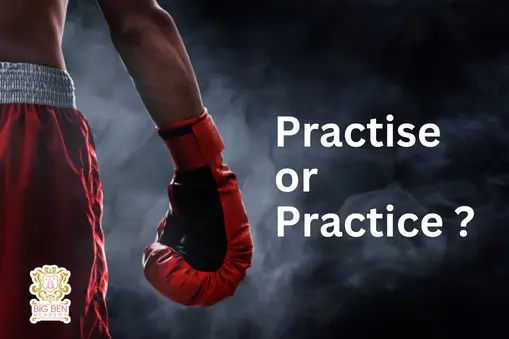Practise or Practice: English Common Mistake
English grammar can be tricky, but don't worry, we're here to help. In this post, we'll cover the difference between the words "practice" and "practise" and when to use each.
In the English language, "Practise" and "Practice" can be a source of confusion of many. Whether you are writing a formal document or having a casual conversation, able to understand the difference between these two phrases is important.
Table of Contents
- Navigating the English Language
- Evolution of 'Practise' to 'Practice' in Language Over Time
- Understanding Practise and Practice
- Common Mistakes When Using "Practise" or "Practice"
- Spelling Differences: "Practice" and "Practise" in UK and US English
- Which one is right: Practise or Practice
- Present Participle Forms: Practicing vs. Practising
- Frequently Asked Question
Navigating the English Language
Navigating the English language can be challenging, especially when it comes to homophones like "practise" and "practice." Understanding the difference between these two words and knowing when to use them correctly is a common area of confusion for English learners and even native speakers.
Evolution of 'Practise' to 'Practice' in Language Over Time"
When compared with the frequency of its use in the printed media (books, magazines, articles, newspapers, etc.), the word 'practise' was more commonly used around the 1600s.
As time goes by into the modern era, the frequency of its use is decreasing. This is different from the word 'practice' which was commonly used in the 1500s, and is coming along with the age advancement. The implication of those data states that the American variant (practice) is used more often than the British (practise). It is not so surprising, seeing the American is somehow simpler to use.

Understanding Practise or Practice
"Practise" (with an "s")
This is a verb form of the word and is used when talking about the action of doing something repeatedly in order to improve a skill or ability.
Examples:
- She need to practise her piano skill everyday.
- I want to practise my speaking every day.
"Practice" (with a "c")
This is a noun form of the word and refers to the actual act of doing something repeatedly to improve a skill or ability. It can also refer to a place where professionals, such as doctors or lawyers, provide their services.
Examples:
- He works at a medical practice in the city.
- Her daily practice of medidation helps her stay calm.
To remember the difference, think of "practice" with a "c" as a noun, like the place you go or the thing you do, and "practise" with an "s" as the action of doing it.
Common Mistakes When Using Practise or Practice
Understanding the distinction between "practise" and "practice" and practicing their correct usage will help you avoid common mistakes when using these words in English.
Using "practice" (noun) when you should use "practise" (verb).
- ❌Incorrect: She wants to practice her piano to improve her skills.
- ✅Correct: She wants to practise her piano to improve her skills.
In this corrected example, "practise" is used as a verb to convey the action of practicing the piano to enhance her skills. "Practice" (noun) refers to the activity of playing the piano regularly, while "practise" (verb) denotes the action of engaging in that activity for improvement.
Using "practise" (verb) when you should use "practice" (noun).
- ❌Incorrect: His medical practise is well-known in the area.
- ✅Correct: His medical practice is well-known in the area.
In this case, "practice" is a noun, and it refers to the medical services or profession of the person. It should not be changed to "practise" because it's not describing the action of practicing medicine; instead, it's referring to the established medical services provided.
Spelling Differences in UK and US English
While 'practise' and 'practice' have different usages, learners often find them confusing. There are notable distinctions in their usage in the UK and the US English.
British English employs a distinction in spelling based on whether it's a noun or a verb, while American English uses the same spelling for both noun and verb forms.
Related Articles:
British English (UK)
- "Practice" (with a "c") is typically used as a noun: "I have a dental practice."
- "Practise" (with an "s") is usually used as a verb: "I need to practise my violin playing."
American English (US)
- "Practice" (with a "c") is commonly used for both the noun and verb forms: "I have a dental practice," and "I need to practice my violin playing."
Which one is right: Practise or Practice ?
As a result, both practise and practice are correct, but it depends on which version of English (UK and US English) you are using and the context in which you intend to use them. (Verb or Noun).
How to Use "Practise" in a sentence ?
Here are some sentences using "practise" in the context of British English, where "practise" is used as a verb meaning to repeatedly do something to improve a skill:
- She needs to practise her dance moves before the performance.
- To excel in mathematics, it's crucial to practise solving various types of problems.
- If you want to become a better cook, you should practise different recipes regularly.
- She plans to practise her French language skills by conversing with native speakers
Example Sentence with "Practice"
- The football team's success is attributed to their rigorous practice sessions, both on and off the field.
- The art of yoga requires regular practice to achieve flexibility and inner peace
- As a lawyer, she had a successful legal practice, handling a wide range of cases.
- In psychology, evidence-based practices are widely used to ensure effective therapeutic interventions.
Present Participle Forms: Practicing vs. Practising
Both "practicing" and "practising" serve the same grammatical function as present participle, which are verb froms used to indicate ongoing actions.
The major difference lies in their regional usage: "practicing" is more common in American English, while "practising" is the British English equivalent (refer to below examples). Choosing between them depends on the English variant you are using.
Here are some examples:
Practicing (American English)
- She is practicing her tennis serve to prepare for the tournament.
- He has been practicing the guitar for years to improve his skills
Practising (British English)
- Practising mindfulness meditation can help reduce stress and anxiety.
- The choir members are tirelessly practising their harmonies for the upcoming concert.
Can I Use 'Practice' and 'Practise' in the Same Sentence ?
Yes ! You can use both in the same sentence. From the perspective of the grammatical usage, using these two words in the same sentence will not causing any English grammatical error. In fact, it helps to elaborate more in the sentence and make it lively and deliver your thoughts.
Here is an example: 'You should practise your dance. Mastery comes with practice.
Frequently Asked Questions
- What is the difference between "practise" and "practice"?
- Can I use "practice" and "practise" interchangeably in casual conversation?
- How can I remember when to use "practice" or "practise"?
- Can you provide examples of "practise" and "practice" used in sentences?
- Are there synonyms for "practice" and "practise"?
The difference lies in their usage in British English (UK) and American English (US). "Practise" (with an "s") is typically a verb in UK English, while "practice" (with a "c") is often used as a noun. In US English, "practice" is commonly used for both verb and noun forms.
In casual conversation, especially in the US, using "practice" for both verb and noun forms is acceptable. However, in formal writing or in UK English, it's better to follow the distinction.
A helpful mnemonic is to think of "practice" (with a "c") as a noun (the place or activity) and "practise" (with an "s") as the action of doing it.
A helpful mnemonic is to think of "practice" (with a "c") as a noun (the place or activity) and "practise" (with an "s") as the action of doing it.
Yes, synonyms include "exercise," "rehearse," "train," and "drill," depending on the context.
Summary
This guide clarifies the differences in both UK and US English. 'Practise' (with an 's') is a verb for repetitive skill improvement, while 'practice' (with a 'c') is a noun for the repeated act or place of skill enhancement.
British English emphasizes the noun-verb distinction, while American English simplifies by using 'practice' for both.
Remember 'practice' as a noun and 'practise' as the action. You can even use both in the same sentence for expressive writing.



